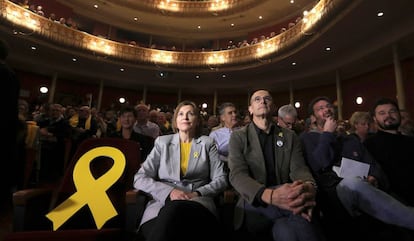The false election promises of the Catalan pro-independence parties
The challenge for pro-secession groups has been how to win over voters after recent failures

In the run-up to regional elections in Catalonia on Thursday, pro-independence parties have been forced to construct arguments on the run to explain why the secession process is still possible despite a failed independence push.
As a result of that illegal secession bid, some key figures were placed in pre-trial custody in a rebellion investigation, as is the case with former deputy premier Oriol Junqueras, while others are on the run in Belgium, where former premier Carles Puigdemont currently finds himself.

In an attempt to explain away this failure, the two largest pro-independence parties, the Catalan Republican Left (ERC) and Junts per Catalunya – the new formation of Carles Puigdemont – now claim that the unilateral declaration of independence passed in the Catalan regional parliament on October 27 was not put into effect because there were fears about a “disproportionate reaction” from the Spanish government of Prime Minister Mariano Rajoy in Madrid.
“On Sunday [two days after the declaration of independence], we wanted to do a series of things, but there was a lot of uncertainty over the reaction of the state and we didn’t want to put too much pressure on civil servants,” said Puigdemont on Monday in an interview with Catalan radio station Rac1.
But this version of events, which all of the candidates have repeated during the campaign race, is contradicted by documents seized by Spain’s Civil Guard police force in Catalonia. Those documents show that several former high-ranking officials knew that the so-called “structures of state” for an independent Catalonia were not yet in place.
One example is the Tax Office. “We are ready,” said Puigdemont in September, in reference to Catalonia’s preparedness to take over management of taxation from the Spanish state. But in private conversations, the region’s highest tax official, Lluís Salvadó, said the office was very unprepared, noting that there was a lack of personnel and that the region didn’t have a central bank or customs control infrastructure. Despite all this, Puigdemont said on Monday: “The structures were all ready, but we decided to suspend the launch.”
This is not the only falsehood or unrealistic promise that the independence parties have employed during the campaign. Here are some of the most common ones.
The release of prisoners. “The prisoners [in pre-trial custody and facing charges of rebellion and sedition for their role in the recent Catalan independence push] will be released thanks to the December 21 vote,” Puigdemont and other Junts per Catalunya and ERC leaders have said during the campaign. Four independence leaders remain in prison: ERC chief Oriol Junqueras, former Catalan interior minister Joaquim Forn, and the former leaders of the pro-independence civic associations Asamblea Nacional Catalana (ANC) and Òmnium Cultural, Jordi Sànchez and Jordi Cuixart. The first two are in prison on the orders of Supreme Court Justice Pablo Llarena. The two activists are in custody at the order of High Court judge Carmen Lamela, and appeals lodged last week were unsuccessful.
The return of Puigdemont. Junts per Catalunya promises daily that if the pro-independence bloc wins the elections, Puigdemont will return from Belgium, where he fled with four former ministers of his government after the October 27 unilateral declaration of independence. “If there is a majority [for the pro-independence parties] that places its trust in us, the premier, deputy premier and ministers who were unfairly dismissed will return. This has to be possible and there is no other alternative,” Puigdemont has said. Puigdemont and his fellow minsters went to Belgium voluntarily to escape the Spanish justice system. They are currently being investigated by the Supreme Court for crimes including rebellion, sedition and misuse of public funds. The result of the December 21 election will not influence the court’s decision as to whether to pursue these charges.
The government will have to lift emergency powers in Catalonia. The use of Article 155 of the Spanish Constitution to dismiss the Catalan government and call elections in the region was approved by the Spanish senate with the support of the ruling Popular Party (PP), the Socialists (PSOE) and Ciudadanos. Puigdemont has said that these parties might not accept the result of December 21 election, but he is asking voters to give a “clear” victory to the pro-independence bloc that would oblige the government to withdraw Article 155. But the withdrawal of emergency powers does not depend on election results.
Rajoy must negotiate. Puigdemont has not used the word “unilateral.” He has gone with the term “dialogue” instead. In his opinion, if the pro-independence bloc wins the election, the Spanish government in Madrid will have no option but to sit down and negotiate how to “implement” the Catalan republic. But Rajoy and his government have already said they are not going to negotiate the implementation of a Catalan republic.
Europe will listen to us. Puigdemont has said the European Union is waiting eagerly for the results of the December 21 election and that his strategy of fleeing to Brussels has been a success. Yesterday, ERC officials once again said that foreign affairs departments keep asking for information about the progress of the independence bid ahead of the election on Thursday.
English version by George Mills.
Tu suscripción se está usando en otro dispositivo
¿Quieres añadir otro usuario a tu suscripción?
Si continúas leyendo en este dispositivo, no se podrá leer en el otro.
FlechaTu suscripción se está usando en otro dispositivo y solo puedes acceder a EL PAÍS desde un dispositivo a la vez.
Si quieres compartir tu cuenta, cambia tu suscripción a la modalidad Premium, así podrás añadir otro usuario. Cada uno accederá con su propia cuenta de email, lo que os permitirá personalizar vuestra experiencia en EL PAÍS.
¿Tienes una suscripción de empresa? Accede aquí para contratar más cuentas.
En el caso de no saber quién está usando tu cuenta, te recomendamos cambiar tu contraseña aquí.
Si decides continuar compartiendo tu cuenta, este mensaje se mostrará en tu dispositivo y en el de la otra persona que está usando tu cuenta de forma indefinida, afectando a tu experiencia de lectura. Puedes consultar aquí los términos y condiciones de la suscripción digital.








































